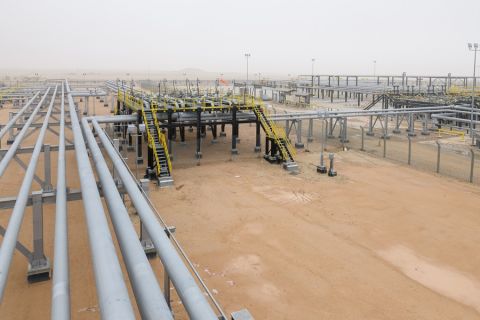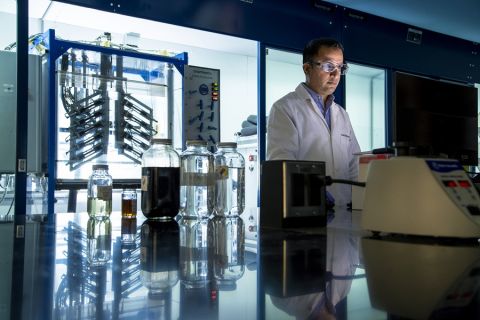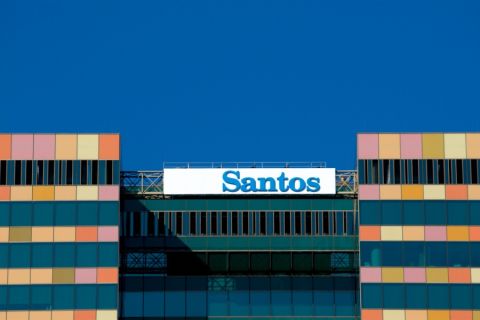Presented by:

Editor's note: This article appears in the special OTC edition of the E&P newsletter. Subscribe here.
If there was one theme to take away from the Offshore Technology Conference’s (OTC) opening general session on Aug. 16, it was this:
As the world strives to solve climate and emission challenges, low-carbon offshore production will help drive net-zero efforts of oil and gas companies, while continuing to provide reliable energy for decades to come.
“Time and time again, offshore has elevated our understanding of what is possible, and the carbon and climate challenges of today will be no different,” said Erik Milito, president of the National Ocean Industries Association, in his opening remarks.
No matter the scenario, he said the global economy will depend upon oil and gas to provide energy that is essential for society, and offshore production can be the “energy anchor” that the world needs.
“Decarbonization from the offshore industry is already underway and will only accelerate as technology advances,” said Amy Bowe, head of carbon research with Wood Mackenzie.
Bowe noted that Wood Mackenzie’s forecast shows significant emission reduction from the offshore sector by 2050 could be achieved with digital advances in subsea system, electrification and associated gas management, which could reduce emissions by 90% or more, bringing the industry closer to its net-zero goal.
She added that although subsea technologies are already widely deployed, significant potential remains to expand their use, not just for development of smaller new field discoveries, but also for larger developments.
“Methane emissions are fairly well-controlled from offshore assets particularly in relation to onshore assets, which partly reflects fewer potential sources of leakages compared to onshore operations," she said. "However, there is still more that could be done in the area of new technologies for emissions mitigation."
Bill Langin, senior vice president of deepwater exploration with Shell, explained what attaining a net-zero goal really means from an operator’s perspective.
“Achieving net-zero means we will continue with projects that will have some associated emissions for decades to come, but at the same time, we will seek to offset projects with natural carbon sinks, nature-based solutions and anything else we can do to mitigate its impacts,” he explained.
Commenting on Shell’s offshore exploration program, Langin said, “We continue to have a deep and dedicated [exploration] program and will continue to spend about $1.5 billion annually on exploration…We won’t do that haphazardously though; we will focus on underpinning our core positions across the world and focus on extending life in those core positions.”
He continued, “You will see us continue exploration because we think hydrocarbons will be a part of the energy mix for decades to come, but we will do it in a very thoughtful way.”
Langin noted that Shell seeks to continue being the largest producer in the Gulf of Mexico (GoM), not just from a net barrels point of view but also from a “cash and environmental point of view.”
He added the barrels produced in the GoM are “in service of the energy transition” having the lowest net carbon footprint globally.
Jonathan Landes, president of subsea at TechnipFMC, noted that his company is extremely focused on reducing the carbon footprint with a robust road map to reduce Scope 1 and 2 emissions by 2030, and the fleet plays a major role in doing so.
“When we think of our fleet, there are two key elements," he said. "The first is around bio fuels where the biggest challenges are availability, accessibility and affordability.”
Another area of focus, Landes noted, is hybridization, adding that TechnipFMC recently converted its second vessel to become a hybrid vessel, reducing its carbon footprint by 20%.
“Looking ahead, we are absolutely convinced that wind, hydrogen and carbon storage can further advance efforts to decarbonize the world’s energy system, and offshore will be a critical part of this,” Landes said.
RELATED CONTENT:
Aug. 19 OTC 2021: BP's Digital Chief Says Execs Need ‘Agile Mindset’ to Manage Transition
Aug. 18 OTC 2021: Digitalization and the Ability for Previously Unimaginable Things
Aug. 18 OTC 2021: Navigating Toward Net-zero Upstream Facilities
Aug. 17 OTC Returns to Houston; A Chat with the OTC Chair
June 29 Video: Why Addressing Oil Sector’s Bad Rep Is Key to Energy Transition
Recommended Reading
Paisie: Crude Prices Rising Faster Than Expected
2024-04-19 - Supply cuts by OPEC+, tensions in Ukraine and Gaza drive the increases.
Brett: Oil M&A Outlook is Strong, Even With Bifurcation in Valuations
2024-04-18 - Valuations across major basins are experiencing a very divergent bifurcation as value rushes back toward high-quality undeveloped properties.
Marketed: BKV Chelsea 214 Well Package in Marcellus Shale
2024-04-18 - BKV Chelsea has retained EnergyNet for the sale of a 214 non-operated well package in Bradford, Lycoming, Sullivan, Susquehanna, Tioga and Wyoming counties, Pennsylvania.
Defeating the ‘Four Horseman’ of Flow Assurance
2024-04-18 - Service companies combine processes and techniques to mitigate the impact of paraffin, asphaltenes, hydrates and scale on production — and keep the cash flowing.
Santos’ Pikka Phase 1 in Alaska to Deliver First Oil by 2026
2024-04-18 - Australia's Santos expects first oil to flow from the 80,000 bbl/d Pikka Phase 1 project in Alaska by 2026, diversifying Santos' portfolio and reducing geographic concentration risk.




